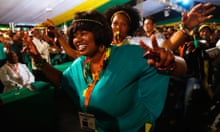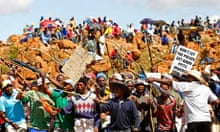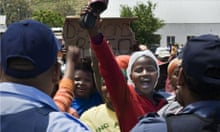Amid apartheid-era songs and hoots from vuvuzelas, South African President Jacob Zuma has swept to victory in his party's leadership contest, effectively securing the continent's most powerful office until 2019.
Zuma trounced his only challenger, deputy president Kgalema Motlanthe, who ran a largely muted and reluctant campaign, by 2,983 votes to 991 at the African National Congress (ANC) conference. A beaming Zuma came to the stage immediately after the announcement (video), waving to the cheering crowd with both hands.
Motlanthe did not contest the deputy presidency, ending a 15-year career in the party's "top six". The position was won resoundingly by Cyril Ramaphosa, a struggle hero turned millionaire tycoon making a long-awaited return to frontline politics. Some believe he is hoping to play "prime minister" to Zuma's head of state.
The results were greeted by a cacophony of cheers and whistles at the conference marquee in Bloemfontein, in Mangaung municipality. Zuma's supporters turned his opponents' rolling hand motion – signalling that he should be substituted like a footballer – against them, mimicking the gesture then throwing their arms apart and hollering in unison.
Later, the president broke from the conference programme to "address one of the fundamental principles of the ANC: the unity of the African National Congress". He said: "The conference has spoken and all of us are part of that decision."
His three-quarter majority defied political gravity in a year that witnessed police massacre 34 striking mineworkers amid spreading unrest, chaos in the education sector, and a scandal over expensive security upgrades to his own home. Somehow he emerged stronger than ever.
It helped that he was up against a challenger who showed little stomach for the fight. The buildup to the conference has also been plagued by disrupted provincial meetings, threats and shootings of local ANC officials and corruption allegations against the president's campaign.
Moreover, the populist Zuma – a Zulu traditionalist with four current wives – retains the loyalty of party rank and file members who may often ignore or even resent newspaper headlines attacking one of their own. The 70-year-old gave a characteristically crowd-pleasing performance at the conference opening on Sunday, singing a liberation song associated with Nelson Mandela that was all but impossible to boo.
"Zuma is as brilliant a tactician in the party as he is an underperformer in the state," said Eusebius McKaiser, a political analyst and associate of the Wits Centre for Ethics. "Soft power has had value in South Africa political culture. South Africans' relationships with politicians and political parties are not reducible to data-driven decisions."
Less predictable was the comeback by Ramaphosa, especially in a year that saw his role in the Marikana massacre scrutinised. The former mineworker's union leader is on the board of mining company Lonmin and called for intervention against the striking workers. Forbes magazine estimates his net worth at about $675m (£416m). A potential conflict of interest between his business and political careers is likely to be a major issue for possibly South Africa's next president.
McKaiser added: "One of the known unknowns is which Cyril Ramaphosa will be deputy president. His CV has so many competing roles and achievements that are ideologically in conflict: the trade unionist versus the corporate giant."
Ten years younger than Zuma, Ramaphosa may be hoping to be the power behind the throne as Thabo Mbeki was during Mandela's often symbolic presidency. But McKaiser said Zuma was unlikely to step back. "He is concerned with building a legacy based on state performance."
Among the biggest losers this week was Julius Malema, who was expelled as president of the ANC youth league earlier this year. A letter from Malema asking the conference to reinstate him has been roundly ignored. Zuma's annihilation of his "forces of change" lobby appears complete.
Meanwhile, four white South Africans have been charged with treason for plotting to bomb the conference and kill Zuma "execution-style". Prosecutor Shaun Abrahams said the men had planned to attack the meeting as a step towards creating an independent Boer republic.
The four, named as Mark Trollip, John Martin Keevy, Johan Prinsloo and Hein Boonzaaier, were brought into court surrounded by police and security guards armed with assault rifles.
Their alleged plan, which the plotters codenamed "The Slaughter of Mangaung", included a mortar bomb attack on marquees housing ANC delegates. That was to be followed by a ground assault targeting Zuma and cabinet ministers as they had dinner, Abrahams told the court. Zuma and others were to be shot "in execution-style".
The intention of the group, which had been trying to buy AK-47 assault rifles, was "directly aimed at eliminating the leadership of this country", Abrahams added.



